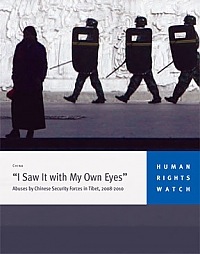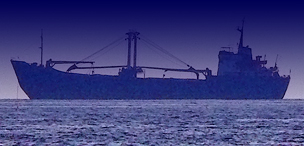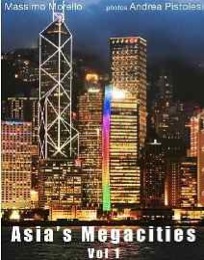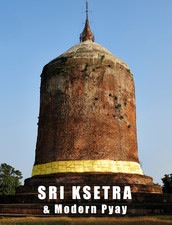Jul 2010
I Saw It with My Own Eyes
25/07/10 12:28 Filed in: Dispatches
“The first thing I saw was a lot of soldiers and police officers beating the crowd with electric batons and then arresting demonstrators and loading them onto trucks”.
“I saw that they were firing straight at people”.
“I saw up to 30 people crowded into 30-40 square foot cells. There was no space to sit down so detainees had to stand most of the day and night. The cells had no toilets but prisoners were not taken out and had to relieve themselves inside the cell. They were given one bowl of rice congee a day. Many were subjected to beatings”.
These excerpts were taken from three of the 203 eyewitness statements recounting the abuse inflicted by Chinese security forces and paramilitary groups (all belonging to the Han ethnic group) during protests staged in Tibet in 2008 and over the last two years.
Independent organisation Human Rights Watch has compiled these statements in a report denouncing acts of violence inflicted on the women, children, monks and nuns who assembled in Lhasa in March 2008 and which very few people know about. According to its authors “the human rights violations that took place were much more severe than anyone might have imagined.” The report also states that “dissenters and their families are still going missing and continue to be the victims of violence, imprisonment and persecution.”
Click here to download the full report

“I saw that they were firing straight at people”.
“I saw up to 30 people crowded into 30-40 square foot cells. There was no space to sit down so detainees had to stand most of the day and night. The cells had no toilets but prisoners were not taken out and had to relieve themselves inside the cell. They were given one bowl of rice congee a day. Many were subjected to beatings”.
These excerpts were taken from three of the 203 eyewitness statements recounting the abuse inflicted by Chinese security forces and paramilitary groups (all belonging to the Han ethnic group) during protests staged in Tibet in 2008 and over the last two years.
Independent organisation Human Rights Watch has compiled these statements in a report denouncing acts of violence inflicted on the women, children, monks and nuns who assembled in Lhasa in March 2008 and which very few people know about. According to its authors “the human rights violations that took place were much more severe than anyone might have imagined.” The report also states that “dissenters and their families are still going missing and continue to be the victims of violence, imprisonment and persecution.”
Click here to download the full report

0 Comments
Men, half men...
22/07/10 14:50 Filed in: Logbook
Let’s play the game of Don Mariano, a character in Leonardo Sciascia’s novel The Day of the Owl.
According to that old mafia Padrino, humanity is divided into five categories: Men, of which there are very few, then Half-Men, few and still decent. Then there are the Pigmies, who are like children trying to be grown-ups, and the “pigliainculo”, the losers, passed over by everyone. Last place is taken by the “quaquaraquà” who, as the name’s sound suggests, are like ducks in a pond, and whose lives have no point or meaning.
To start this game, the player has to be prepared to put himself out there. Only then is the game on. Jon Krakauer, the writer and journalist known for his non-fiction books such as “Into Thin Air” and “Into the Wild”, has put himself out there, placing himself among the half-men or even the “quarter-men”, half of a half-man, but perhaps he’s unconsciously thinking of the quarterback in American football to lessen his limitations (the quarterback is after all the most important man on the pitch).
For Krakauer, Men are people like the protagonists of his books. Especially the last one: Pat Tillman, an American football player who left his career and enlisted to go to Afghanistan, where he was killed in a friendly fire incident. His story is told in the book Where Men Win Glory: The Odyssey of Pat Tillman.
«He walked the tightrope between opposites. He was full of contradictions and doubts but he accepted them. He managed to control them. Once he had chosen his path, he followed it all the way» Krakauer tells me. Then he quotes Emerson: “Always do what you are afraid to do”.
As you can see, this game can become very dangerous. But the risk isn’t physical. «Taking risks is easy, especially when you’re young» says Krakauer, who has taken his fair share and almost put an end to his human adventure on Everest. Real danger is finding yourself on murky ethical ground, giving in to pride, losing yourself in that theatre of shadows where honour and courage may just be a front for arrogance and egocentricity. Where men would like to be men, but little by little slip into the lower categories. This is, in Krakauer’s view, what happened to General McChrystal, “a man of great skills, who would not normally compromise his principles to get results”, but who appears to have done just that when he allegedly concealed the real cause of Tillman’s death for personal ambition.
It’s an even more dangerous game for those that tell the story of these Men: they move in treacherous territory, where they need to walk a fine line between demons and influences, where it's easy to fall into moralising or even abuse. As Nietzsche wrote: "if you gaze for long into an abyss, the abyss gazes also into you".
This also happened to Sebastian Junger, another American reporter known mainly for The Perfect Storm. His latest work is Restrepo, a multimedia operation that relates the life of a platoon of American soldiers in a remote Afghan outpost. It's a powerful, epic work of extraordinary complexity. A work which embodies what the philosopher James Hillman called a terrible love of war, where one is pushed into a “martial state of the soul”. This is why Junger was accused of writing about war “as if it is a storm at sea, a force of nature that is ... put on earth to test men’s strength, wits and courage. Junger’s view of war is a purely apolitical one, a timeless condition of man”.
Junger, even more than Krakauer, is open to contradictory, even unsettling, interpretations. But both are testaments to total, uncompromising journalism. In the end neither Krakauer nor Junger, nor even a thousand heroes’ faces can be pigeon-holed into Don Mariano’s game. Maybe this is the real solution to the game. Don’t play it.
According to that old mafia Padrino, humanity is divided into five categories: Men, of which there are very few, then Half-Men, few and still decent. Then there are the Pigmies, who are like children trying to be grown-ups, and the “pigliainculo”, the losers, passed over by everyone. Last place is taken by the “quaquaraquà” who, as the name’s sound suggests, are like ducks in a pond, and whose lives have no point or meaning.
To start this game, the player has to be prepared to put himself out there. Only then is the game on. Jon Krakauer, the writer and journalist known for his non-fiction books such as “Into Thin Air” and “Into the Wild”, has put himself out there, placing himself among the half-men or even the “quarter-men”, half of a half-man, but perhaps he’s unconsciously thinking of the quarterback in American football to lessen his limitations (the quarterback is after all the most important man on the pitch).
For Krakauer, Men are people like the protagonists of his books. Especially the last one: Pat Tillman, an American football player who left his career and enlisted to go to Afghanistan, where he was killed in a friendly fire incident. His story is told in the book Where Men Win Glory: The Odyssey of Pat Tillman.
«He walked the tightrope between opposites. He was full of contradictions and doubts but he accepted them. He managed to control them. Once he had chosen his path, he followed it all the way» Krakauer tells me. Then he quotes Emerson: “Always do what you are afraid to do”.
As you can see, this game can become very dangerous. But the risk isn’t physical. «Taking risks is easy, especially when you’re young» says Krakauer, who has taken his fair share and almost put an end to his human adventure on Everest. Real danger is finding yourself on murky ethical ground, giving in to pride, losing yourself in that theatre of shadows where honour and courage may just be a front for arrogance and egocentricity. Where men would like to be men, but little by little slip into the lower categories. This is, in Krakauer’s view, what happened to General McChrystal, “a man of great skills, who would not normally compromise his principles to get results”, but who appears to have done just that when he allegedly concealed the real cause of Tillman’s death for personal ambition.
It’s an even more dangerous game for those that tell the story of these Men: they move in treacherous territory, where they need to walk a fine line between demons and influences, where it's easy to fall into moralising or even abuse. As Nietzsche wrote: "if you gaze for long into an abyss, the abyss gazes also into you".
This also happened to Sebastian Junger, another American reporter known mainly for The Perfect Storm. His latest work is Restrepo, a multimedia operation that relates the life of a platoon of American soldiers in a remote Afghan outpost. It's a powerful, epic work of extraordinary complexity. A work which embodies what the philosopher James Hillman called a terrible love of war, where one is pushed into a “martial state of the soul”. This is why Junger was accused of writing about war “as if it is a storm at sea, a force of nature that is ... put on earth to test men’s strength, wits and courage. Junger’s view of war is a purely apolitical one, a timeless condition of man”.
Junger, even more than Krakauer, is open to contradictory, even unsettling, interpretations. But both are testaments to total, uncompromising journalism. In the end neither Krakauer nor Junger, nor even a thousand heroes’ faces can be pigeon-holed into Don Mariano’s game. Maybe this is the real solution to the game. Don’t play it.
We’re Sorry Thailand
21/07/10 13:12 Filed in: South-East Asia
The Thai censorship board has banned the broadcasting of a video clip entitled “We’re Sorry Thailand”. According to the board, the clip, which includes scenes from last May’s uprising, may trigger further protests and clashes among factions.
Thai Prime Minister Abhisit Vejjajiva has asked for the ban to be removed, judging the video for what it actually appears to be: a declaration of shared responsibility. By doing so he is sending a strong signal, which seems to demonstrate a serious will to move towards national reconciliation, and above all towards implementing profound change in the culture and society.
Unfortunately, censorship appears to be sending an even stronger signal, one inspired by the desire to continue presenting the country as the “Land of Smiles”.
If this line prevails, perhaps even more apologies will have to be made to Thailand.
The banned cip
Thai Prime Minister Abhisit Vejjajiva has asked for the ban to be removed, judging the video for what it actually appears to be: a declaration of shared responsibility. By doing so he is sending a strong signal, which seems to demonstrate a serious will to move towards national reconciliation, and above all towards implementing profound change in the culture and society.
Unfortunately, censorship appears to be sending an even stronger signal, one inspired by the desire to continue presenting the country as the “Land of Smiles”.
If this line prevails, perhaps even more apologies will have to be made to Thailand.
The banned cip
Aspirasians
07/07/10 15:37 Filed in: Dispatches
A street kid from Mumbai who escapes the reformatory and rescues a child from a vicious dog. He then begins a search for the boy’s mother. The problems faced by a young Japanese divorcee who returns to her hometown with her daughter. The lives of three Beijing taxi drivers, between memories of the Cultural Revolution and aspirations of entrepreneurial success. The strange journey of a Palestinian man who washes dishes in a Japanese restaurant while attempting to become a sumo wrestler. The tale of how music and dance can help a group of Filipinos address anger issues. These are the protagonists and stories of the films presented in Hong Kong at the latest edition of the Asia Society Summer Film Series. These are the stories of the Aspirasians, of those attempting to enter or living on the margins of the new Asia, which is widely expected to control the future of our planet. In order to do that, however, it will first have to deal with hundreds of millions of people such as these.





